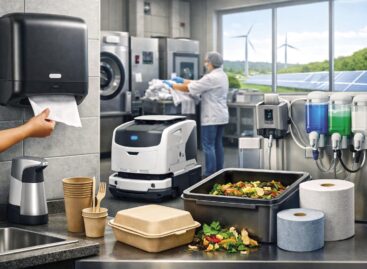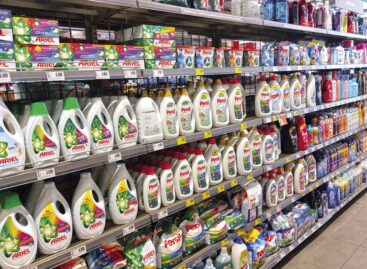We were learning together (Part 2)
Almost 1,100 “students” enrolled at the FMCG Open University, to learn from the best professors from different departments of the HoReCa and FMCG sector at the Trade Campus, in Hotel Pelion in Tapolca on 23-27 September. In the second part of our report we give you an overview of the last two days, Thursday and Friday.
This article is available for reading in Trade magazin 2024/12-2025/01
Zsuzsanna Hermann, CEO and editor-in-chief of Trade magazin and rector of the FMCG Open University welcomed the audience and the speakers of the day, and then she gave the floor to communications expert Szilvia Krizsó, who was the moderator of the day.

The conference conference opened with a jam-packed room also on Thursday at the Hotel Pelion in Tapolca at the end of September. Business Days 2024 was again the largest FMCG conference in Hungary, with each and every side of the business represented
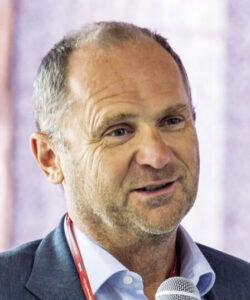
György Jaksity chairman of the board of directors Concorde
In his opening presentation György Jaksity, chairman of the board of directors at Concorde pointed out that geopolitical conflicts around the world are exacerbating economic instability, particularly through their impact on energy prices. Although inflation is slowly diminishing, the future impact of the interest rate policies of central banks and further rate cuts is questionable.
Economic competition between the US and China is intensifying. The situation in Europe is characterised by low productivity levels in the euro area, particularly in Germany.
Hungary suffers from high inflation, low productivity and structural problems.
“Optimistically suffering” brands
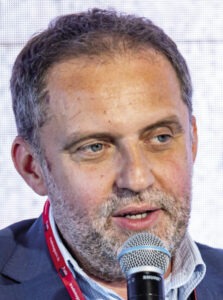
Tamás Ács
head of country
Unilever
Owing to the vulnerability of the Hungarian economy, food inflation has been more pronounced here, resulting in a high level of consumer mistrust, said Tamás Ács, head of country at Unilever, during the roundtable discussion on the situation of manufacturer brands.
In times of low consumer confidence, Unilever is concentrating on strong brands, giving them priority support and focusing on consumer loyalty.

Dr. Ágnes Fábián
managing director
Henkel
Despite the challenges, Henkel has performed well in the past period, and the Hungarian business unit even outperformed the regional average, revealed managing director Dr Ágnes Fábián.
The goal is to achieve growth not only in value, but also in volume, supported by portfolio development and significant innovation.

Péter Noszek
CEO
Nestlé
Although production costs have dropped in several categories, the prices of cocoa and coffee – which are key for Nestlé – have increased significantly. This has put a strain on the prices of essential products, making it difficult for the middle class to buy, explained Péter Noszek, the CEO of Nestlé.
Nestlé has invested a total of HUF 300bn in the Bük factory over the past years.
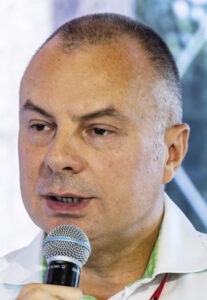
Attila Sófalvi
general manager
MARS
MARS has recently undergone a big organisational restructuring. With the reorganisation, the company seeks to reap the benefits of its size and to achieve more efficient portfolio management and market presence, informed general manager Attila Sófalvi.
As MARS isn’t subject to stock market pressure, it enjoys greater freedom to pursue its long-term strategic goals.
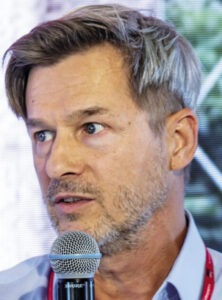
Zoltán Venter
country manager
Essity
Zoltán Venter, country manager of Essity told that the stagnation of the European and Hungarian markets is causing difficulties in value creation, so cost reduction and innovation are key for the company – the latter especially with premium products and sustainability-based developments.
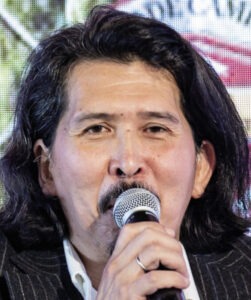
Zoltán Fekete
secretary general
Branded Goods Association Hungary
Hungarian companies are “optimistically suffering”: they are on a difficult path, but they are doing their best to ensure that consumption recovers, summarised Zoltán Fekete, secretary general of Branded Goods Association Hungary.
He is always in talks with government partners, in order to ease the regulatory and tax burden on the market.
The trade helps students

Tibor Székács
president
Chain Bridge Foundation
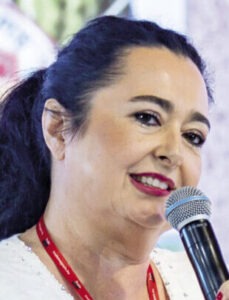
Zsuzsanna Hermann
chairwoman of the board of trustees
Chain Bridge Foundation
Next Zsuzsanna Hermann gave an insight into the work of the Chain Bridge Foundation, in her capacity as president of the board of trustees. The programme supports talented but financially disadvantaged secondary school students to enter higher education.
They receive a one-off grant of HUF 350,000 to start university or a total of HUF 3m over ten semesters. In addition to this, the foundation also offers mentoring, internships and professional contacts in cooperation with leading companies in the FMCG industry.
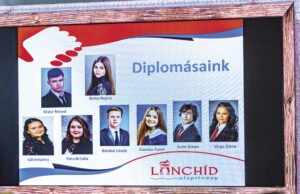
Since its launch, in the past 8 years, thanks to the support of companies and individuals, the Chain Bridge Foundation has been able to provide 33 disadvantaged secondary school students with a one-off start of school grant or a 10 semester grant for their higher education studies
„Brand Footprint 2024 Global & Hungary”
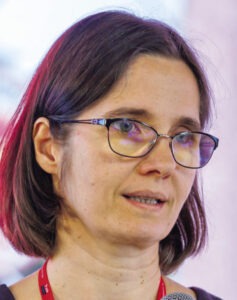
Krisztina Bakonyi-Kovács
senior consultant
Consumer Panel Services
GfK-YouGov
After lunch Krisztina Bakonyi-Kovács, senior consultant at Consumer Panel Services GfK-YouGov presented the results of the Brand Footprint research, which covers 62 countries on five continents. The research analyses more than 42,000 FMCG brands and ranks them globally.
In 2023 Coca-Cola was the world’s most chosen brand, chosen more than 8 billion times by consumers, while Ferrero’s Kinder was the top brand in Hungary. The winner in the Rising Star category was Alföldi Tej’s Riska milk brand, which realised the highest CRP growth.

Tünde Turcsán
managing director
Consumer Panel Services
GfK-YouGov
The awards were presented to the winners by Tünde Turcsán, managing director of Consumer Panel Services GfK-YouGov.

János Kapitány
head of direct sales and promotion
Atmedia
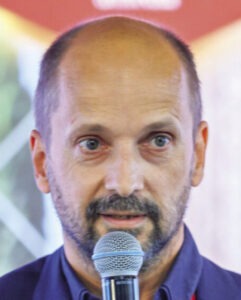
András Galavics
head of radio division and sales
Atmedia
Next András Galavics, head of radio division and sales at Atmedia and János Kapitány, head of direct sales and promotion demonstrated in a very tangible way that radio continues to be a very effective tool in brand building.
Their research looked at the effects of three radio spots with the same text but completely different sounds, proving that a well-crafted audio ad alone can launch a new brand from scratch.
Promotional leaflets still have power

Zsolt Sipos
head of sales
Offerista Group

István Zsatkulák
commercial director
Offerista Group
After the presentation on radio ads István Zsatkulák, commercial director of Offerista Group and Zsolt Sipos, the company’s head of sales spoke about the role of promotional leaflets in Hungary.
According to a representative survey of 1,035 people conducted by the company, 94% of the Hungarian population read promotional leaflets – one-third of them several times a week. 21% now use only print copies, while 30% browse only digital offers and 43% follow both formats.

Gábor Tolnai
head of marketing insight division
Kantar Hoffmann
Gábor Tolnai, head of marketing insight division at Kantar Hoffmann gave a presentation on the world’s best performing FMCG advertisements.
The measurement tool that Kantar’s LINK+ research methodology uses is based on consumer ratings, using facial coding and AI tools.
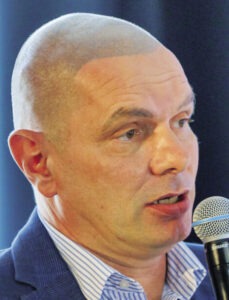
Erik Vágyi
managing director
NielseniQ
Erik Vágyi, managing director of NielsenIQ shed light on the challenges and opportunities of the FMCG sector. Although retail volumes in Hungary have been declining in recent months, there were small signs of growth, too.
Consumer confidence is improving, which – if the trend lasts – could be reflected in consumption in 2025. Currently 42% of purchases are made in promotion.
Hyper- and supermarkets: victories and woes
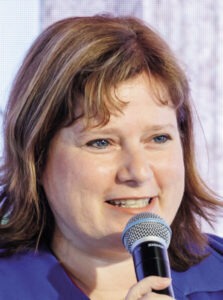
Gabriella Heiszler
president
SPAR
SPAR’s president-CEO Gabriella Heiszler told in the roundtable that they are focusing on store improvements: by 2030 refrigeration equipment will be replaced with more sustainable solutions and the interiors of 9 INTERSPAR stores will be redesigned.
The cooperation with Orlen is fruitful, with more and more DESPAR units opening at petrol stations, plus the franchise network is also expanding.
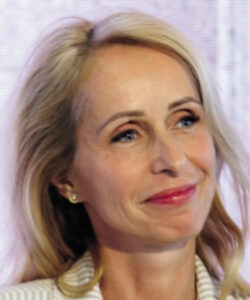
Viktória Lucenko
CEO
Auchan
The cooperation between Auchan Magyarország Kft. and its minority partner has reached the competition authority stage. However, Auchan CEO Viktória Lucenko said that regardless of the conclusion of the deal, they are motivated to achieve their strategic and operational goals: the retailer is planning a five-channel model and envisages opening smaller stores and petrol station shops.
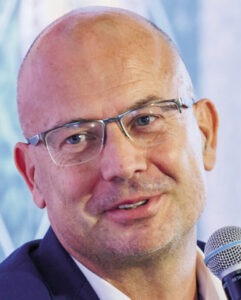
György Sóskuti
deputy CEO
Bonafarm
György Sóskuti, deputy CEO of Bonafarm pointed out that the company is already looking abroad for most of its expansion. They are planning to enter the milk-scarce markets of the Balkans and Western Europe, where they would sell mainly premium products such as salami. The group’s factories in Szeged are about to undergo new labour-intensive investments, which foresees further recruitment difficulties.
Fast and secure payment experience
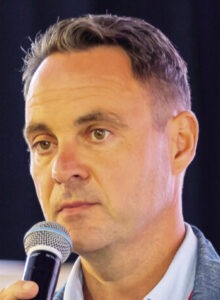
Ferenc Szász
business development director
Mastercard
Ferenc Szász, business development director of Mastercard gave a presentation on the future of digital payment solutions and the opportunities to enhance the customer experience.
Mastercard’s goal is to increase the proportion of debit card payments from the current 38% to 60-70%. He stressed that contactless and cashierless payment are the key to customer convenience and satisfaction.
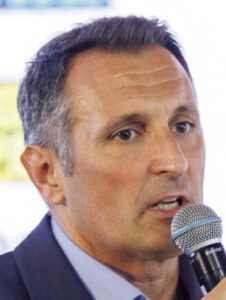
Lajos Szabó
head of retail
Szerencsejáték
Lajos Szabó, head of retail at Szerencsejáték Zrt. spoke about the company’s retail development projects and plans. Their nationwide network includes around 7,400 points of sale, from which 2,000 are exclusively selling lottery tickets.
At these points the company is planning to introduce a new mini terminal system that will make real-time sales monitoring and promotional support possible.
The service station channel is also transforming
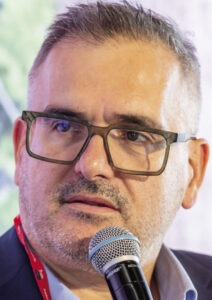
Dr. András Orosz
retail director
MOL
Dr András Orosz, retail director of MOL admitted during the roundtable discussion that fuel sales have been greatly influenced recently not so much by fuel prices, but by declining household incomes and tourism.
More and more people are looking for gastronomic services in addition to fuel purchases, as indicated by the success of the Fresh Corner concept. The company’s sales in the gastro category have grown by 113% since 2021.
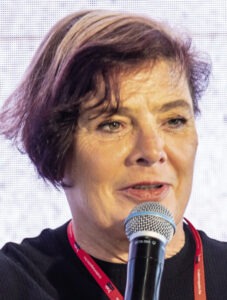
Sarolta Vecsey
mobility managerfor Shell in Hungary and Slovenia
Sarolta Vecsey, mobility manager for Shell in Hungary and Slovenia underlined that Shell is concentrating on the development of shop and convenience services, such as loyalty programmes and car washes.
Electric chargers, which aren’t yet a primary source of revenue at the moment, are seen as a long-term investment. It was told at the conference that the price cap had had a negative long-term influence on the market, as it caused significant market distortions by suppressing natural price movements.
Drugstores at full throttle
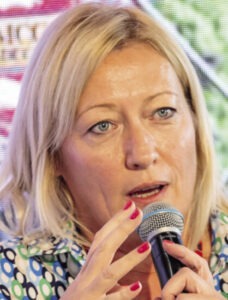
Ágnes Bárczi-Elek
director of purchasing
Müller
Müller is closing a successful period, in part because there is increased demand for the premium segment – Müller is a kind of love brand and people like to shop there, said director of purchasing Ágnes Bárczi-Elek in the next roundtable.
A large selection of branded product is a big part of Müller’s appeal, but their high-quality private label products are also popular with cost-conscious shoppers.
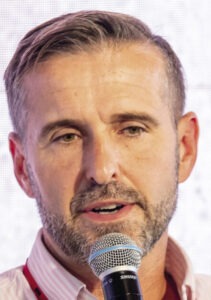
Ferenc Czigány
head of sales
Ecofamily
According to head of sales Ferenc Czigány, Ecofamily’s product portfolio is built on strong brands, while also placing emphasis on diversification to offer customers different price levels.
Their goal is to be able to adapt to all budgets and customer needs, and they now sell an average of 10,000 SKUs in Ecofamily stores.
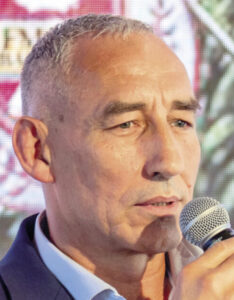
István Dobi
owner
Dél-100
Dél-100 is in a special situation, as its different-sized stores offer a wide range of products in rural areas and smaller towns, where there are fewer competitors, explained István Dobi.
Dél-100 doesn’t have its own brand, so it relies on cooperation with strong brands that are well-known in the market and they pay special attention to health-conscious and sustainable products.
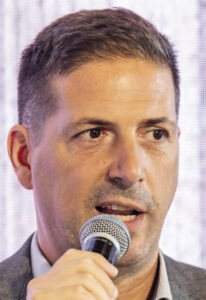
László Flórián
managing director
Rossmann
László Flórián, managing director of Rossmann stressed that one of the reasons for the success of drugstores is the compact and well-optimised store space, together with the large selection of products, which is less typical of discounters.
As part of its innovation strategy, Rossmann is building a modern logistics centre that will use semi-automated technology to ensure more efficient storage of slow-moving products.
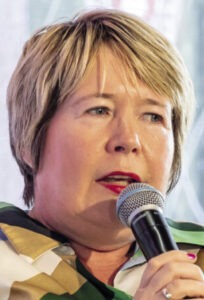
Mariann Józsa
managing director
dm
Customers feel at home in dm stores, as a pleasant shopping experience is important for them, told managing director Mariann Józsa.
Dm treats its own brands the same ways as manufacturer brands, relying on strong brand building work. These own brands have been present in the market for decades and seek to meet different customer needs with a high level of innovation. Dm is also focusing on digitalisation and innovations to enhance customer convenience.
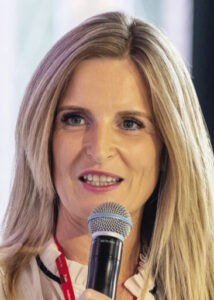
Zsuzsanna Szak
Consumer Brands
general manager
Henkel
Zsuzsanna Szak, general manager of Henkel Consumer Brands emphasised the outstanding performance of drugstores. The company’s strategy is to have several brands within a category, so that Henkel can meet different customer needs while expanding its market reach.
The company’s plan is to make its European factories climate neutral by 2024.
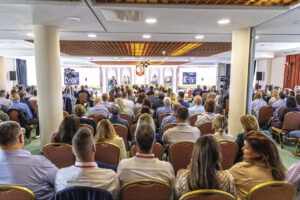
Different recipes, different successes. Yet there are common traits to be clearly seen in the discussions. It is always worth listening to other’s experiences, insights and collecting ideas for the future – just like the conference audience did this year
Successful brand integration
In a short presentation about the cooperation between the television programme Next Topmodel Hungary and Henkel Magyarország, Erika Csikesz, sales and digital director of TV2 Media Group and Anna Siba, head of marketing at Henkel talked about how the Schwarzkopf Gliss brand was tied in with the show. Henkel’s goal was to promote the brand’s new image and bring it closer to Hungarian consumers, an important step in which was to make the winner, Lili Mészáros, the new brand ambassador of Schwarzkopf Gliss hair care products.

During the drugstore roundtable, a successful cooperation between Henkel and Tv2 was presented by Erika Csikesz, Digital and Sales Director of Tv2 Media Group and Anna Siba, Marketing Director of Henkel
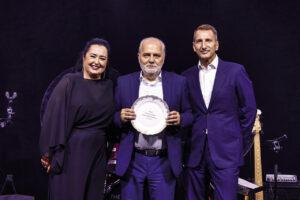
In memory of 21 years: László Hovánszky had been founding president to the Chain Bridge Club Association from 2003 on. In September this year, after 21 years, he passed on his position to Tibor Székács, who is also a founding member of the Club. László Hovánszky will continue his work in the Association as Honorary President for Life
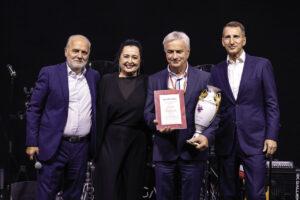
Every year, we experience wonderful moments at the Thursday evening Gala Dinner, where so many prizes are awarded. This year’s Lifetime Achievement Award has been presented to Zoltán Soós, founder of Soós Tészta, along with a long speech, a great salute and even greater professional and human tribute. Our heartfelt congratulations!

Jubilant companies’ and brands’ names are lined up each year to be congratulated to by the entire profession on stage at the Business Days gala dinner. This year, as always, they have received a personalised Hollóházi porcelain vase with unique graphics and paintings on it. Happy Anniversary!
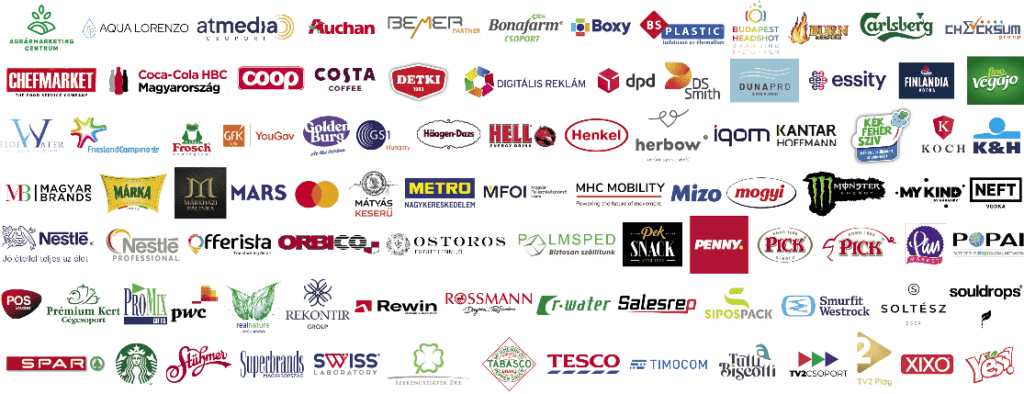
BUSINESS DAYS WILL BE ORGANISED NEXT YEAR AGAIN
BETWEEN SEPTEMBER 22–26 2025, WITH AN EXTRA WEEKEND!
Come and join us!
Constant updates available on the BusinessDays.hu website.
Related news
Hygiene on new foundations
🎧 Hallgasd a cikket: Lejátszás Szünet Folytatás Leállítás Nyelv: Auto…
Read more >Related news
Tesco sets out store expansion plans in 2026 including five former Amazon Fresh sites
🎧 Hallgasd a cikket: Lejátszás Szünet Folytatás Leállítás Nyelv: Auto…
Read more >Brits Embrace At‑Home Celebrations While Germans Cut Back on Valentine’s Day Spending
🎧 Hallgasd a cikket: Lejátszás Szünet Folytatás Leállítás Nyelv: Auto…
Read more >

